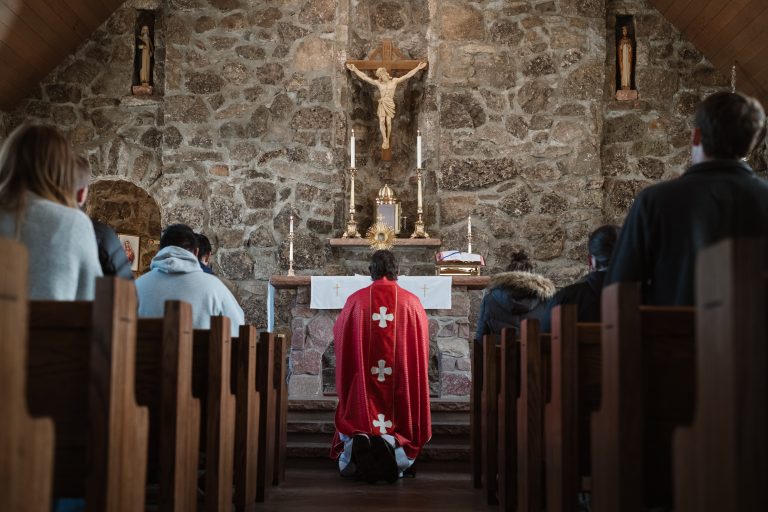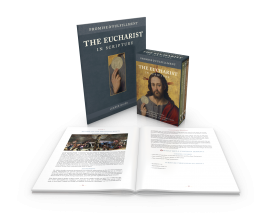By Leon J. Suprenant Jr. and Philip C.L. Gray
Together, Leon Supernant and Philip Gray are the authors of Faith Facts, a series of two books answering common questions on the Catholic faith.

The Most Holy Eucharist is the body and blood of Our Lord and Savior Jesus Christ (cf. Matt 26:26-28; John 6:55). Because this sacrament is the fullness and substance of His divinity and humanity, His presence demands proper adoration.
In general, adoration of the Blessed Sacrament occurs both during the celebration of Mass and outside of Mass. Without a doubt, the liturgy of the Mass is the greatest act of worship we offer Our Lord here on earth. This celebration expresses the fullness of our faith and gives us a foretaste of heaven’s glory.
Outside of Mass, adoration of the Most Holy Eucharist occurs whenever we worship and offer prayers to God in the presence of the Blessed Sacrament. Adoration of the Blessed Sacrament outside of Mass is strongly encouraged. It has taken many forms throughout the history of the Church. In the early centuries of the Church, there is record that some of the faithful reserved the Blessed Sacrament within their homes privately.
By the thirteenth century, a well-developed practice of adoring Christ in the Eucharist had developed within the Church. Recognizing the importance of such devotion to combat heresies and spiritual deprivation within society, Clement VIII issued a decree on November 25, 1592, in which he established the Forty Hours devotion, which established adoration in different parishes so that there was never a time when adoration wasn’t taking place somewhere.
Subsequent popes continued this important work of prayer, which has continued up to this century in the city of Rome. Furthermore, on August 20, 1885, Pope Leo XIII “ordered the solemn exposition and benediction of the Blessed Sacrament every day of October as part of the Rosary devotions when held in the evening in all parish churches.”
By the time Pope Paul VI was elected to the See of Peter, continuous exposition beyond forty hours had become customary in certain places. This is commonly known as perpetual adoration. To protect the Blessed Sacrament from abuse and encourage this type of adoration, the Vatican Congregation of Rites promulgated the 1967 instruction Eucharisticum Mysterium. In addressing “continuous” or perpetual adoration, Eucharistiae Sacramentum notes two possibilities: adoration initiated by the faithful, and adoration initiated by the local bishop in which the faithful are ordered to participate. By “reasonable number of the faithful,” the Church expects that the Blessed Sacrament will not be left unattended if exposed.
The term “serious and general need” refers to the determination by the local bishop that a particularly grave situation in his diocese requires the prayerful intervention by all. Clement VIII saw the need to protect the See of Rome from spiritual attacks by ordering Forty Hours devotions held in such a way that exposition was continuous.
A bishop today can do the same in his diocese for similar reasons. For example, some bishops in the United States are addressing their priest shortage by encouraging Eucharistic exposition and adoration in their dioceses and ordering it to be held in the cathedral church. They specifically request that these prayers be offered for vocations. By “larger numbers,” the instruction envisions the bishop’s ordering such adoration in large parishes only, lest his decree become a burden for the faithful in smaller parishes.
In short, if the faithful wish to have Eucharistic exposition and adoration, their desire to worship and adore is reason enough, assuming adequate participation. On the other hand, if the bishop were to order the faithful to participate in public, continuous exposition of the Blessed Sacrament, he would have to have a serious reason, and should only make the demand on the larger parishes. In both instances, flexibility is provided if adequate numbers are not available. This flexibility is intended to encourage continuous exposition and adoration of the Blessed Sacrament.
We can do several things to foster Eucharistic adoration, particularly exposition. We should worship the Most Holy Eucharist at every opportunity. At the very least, opportunity exists every time we pass a church in which the Blessed Sacrament is reserved. Saint Philip Neri could not pass a church without stopping for a visit and, if locked, he would pray at the door. Because of his efforts, Forty Hours devotion spread through the parishes in Rome, even before the decree of Clement VIII. Following the example of so great a saint, we could express our intimate love for Our Eucharistic Lord by making an ejaculatory prayer with the Sign of the Cross every time we pass a church. Such acts keep us focused on our Eucharistic Lord and make us docile to the promptings of the Holy Spirit.
If exposition of the Blessed Sacrament does not occur regularly in your parish, approach the pastor and request it. First, spend some time every day for thirty days in adoration before the Blessed Sacrament. Become accustomed to scheduled visits. Meditate on His Real Presence. Study the documents of the Church that discuss this subject. In this way, you will be prepared both spiritually and mentally to approach your pastor, answer his questions, and accept his decisions.
If exposition already occurs in your parish or a neighboring parish, become involved. If already involved, try to arouse interest in having a local Eucharistic congress. This will help spread the word about Eucharistic exposition and increase devotion to the Blessed Sacrament.
Most importantly, do not neglect to attend Mass. Attendance during the week, if possible, is a most important way to adore Our Lord and encourage devotion to the Blessed Sacrament. All our prayers and devotions must be directed to this greatest of prayers.
You Might Also Like

In The Eucharist in Scripture, discover God’s plan as it is expressed through the Bible and the Mass. This six-lesson study, presented by Dr. Scott Hahn, will unlock the meaning of covenant, sacrifice, and sacrament as understood in the Bible, from Genesis through Revelation.

